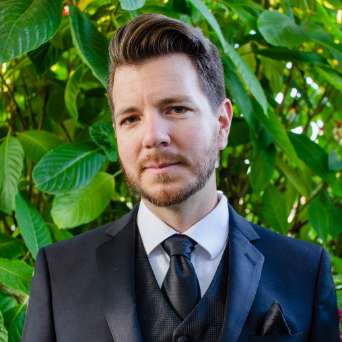“The most beautiful sound an audience can make,” Dudamel told the expectant masses, “is silence.” They chuckled knowingly. Dudamel’s request was borne out of the obvious production being made of Tuesday night’s performance. The giant boom and manned onstage cameras indicated that the performance was indeed being filmed. According to the maestro, it was the first time the LA Phil had recorded at the Hollywood Bowl in ten years. The practical reasons for this would become quite apparent as the evening went on, but despite numerous intrusions, Tuesday’s performance of Verdi’s Requiem was one for the ages.
Centered around the superstar conductor and an equally notable cast of soloists, this was one LA event that lived up to its hype. Dudamel, who I’ve found in the past to be too doting and contemplative for his own good, showed a remarkable aptitude for “Verdian” drama. The opening, all but inaudible, was born out of nothingness, as if approaching from a distance. The a cappella Te decet hymnus was funereal. The ensuing Kyrie anticipatory with finely controlled apexes. The Dies irae was fierce and relentless in tempo and temperament. It was a wonderful sequence in its pacing, and an approach that would continue for the remainder of the evening as part of a wholly revelatory interpretation.
The success of this interpretation though was due in large part to the uniform excellence of the artists. The four soloists were a throwback to the golden age of singing, mammoth voices singing Verdi. Soprano Julianna Di Giacomo was particularly outstanding. Her large soprano voice was pliable with a burnished lower register and searing high notes; her phrasing and line seemed endless. Furthermore, her dramatic acuity was exemplary and resulted in a gripping Libera me. Di Giacomo’s is the truest Verdi soprano voice I’ve heard in recent memory.
Veteran mezzo-soprano Michelle DeYoung was equally as thrilling. While her high notes lacked a bit of focus, overall it is a marvelous, thrilling instrument. Hers was a magnetic presence with a compelling, dramatic Liber scriptus. Both DeYoung’s and Di Giacomo’s musical sensitivity was inspired in the Agnus Dei.
Superstar tenor Vittorio Grigolo sang with power and a keen sense of drama. His timbre is bright with plenty of squillo. Though lacking foundation in his lower register, it is still a compelling instrument with secure high notes. His Ingemisco suffered from a bit of crooning that didn’t play particularly well through the amplification, but his dramatic rationale was sound as his vulnerability, supported by Dudamel’s indulgent hand, was highly moving. If not a necessarily authoritative voice, it is a resplendent one.
Bass Ildebrando D’Arcangelo sang with his reliable power and consistency of tone that is a pleasure to hear. It is a wonderfully balanced bass voice that excites and is communicative. His Tuba mirum was thunderous.
Dudamel’s orchestral forces were responsive and majestic. They were in complete harmony with Dudamel’s vision of the piece, turning from rapt romanticism to terrifying fury on a dime. The brass in particular played with shattering authority. The strings were quite controlled, leaning in when necessary, and playing with homogeneity of ensemble in the piece’s most vulnerable moments. Principal oboist Ariana Ghez and bassoonist Whitney Crockett were outstanding as always.
The Los Angeles Master Chorale sang with excitement and outstanding musicality. Their excellent diction, filled with potent plosives and fiery fricatives, were just one of the tools they employed in the service of Verdi’s drama. They could sound both formidable and terrified at the same time. Their flexibility of ensemble, dynamic range, and sheer beauty of sound made for a wonderful contribution.
Still, this performance, the summation of all-around outstanding parts, was elevated by Dudamel’s vision of Verdi’s masterpiece. While not a turbulent reading, it veered through Verdi’s textures with knowing humility and awe-inspiring power while never sacrificing musical refinement. The build-up to the Tuba mirum was shockingly raw, the inner ensemble of the Sanctus was sprightly and lyrical. At its heart, Dudamel’s was a vision that underlined the fragility and vulnerability of the human body and human soul at the time of death. Yes, there was fire and brimstone, but there was visceral fear paired with human empathy. From the point of view of those praying for the souls of the departed, it was clear that they were all too aware that their time was near as well. It was a shattering performance.
Sure, there were intrusions: no less than three helicopters, a malfunctioning piece of camera equipment that made jarring thuds, and downright terrible video work with non-existent subtitles for the majority of the piece were distracting. Yet, it seemed like nothing could phase Dudamel and his forces. They were nothing short of masterful and gave Verdi an ideal tribute. Dudamel and Verdi is a pairing not to be missed.


